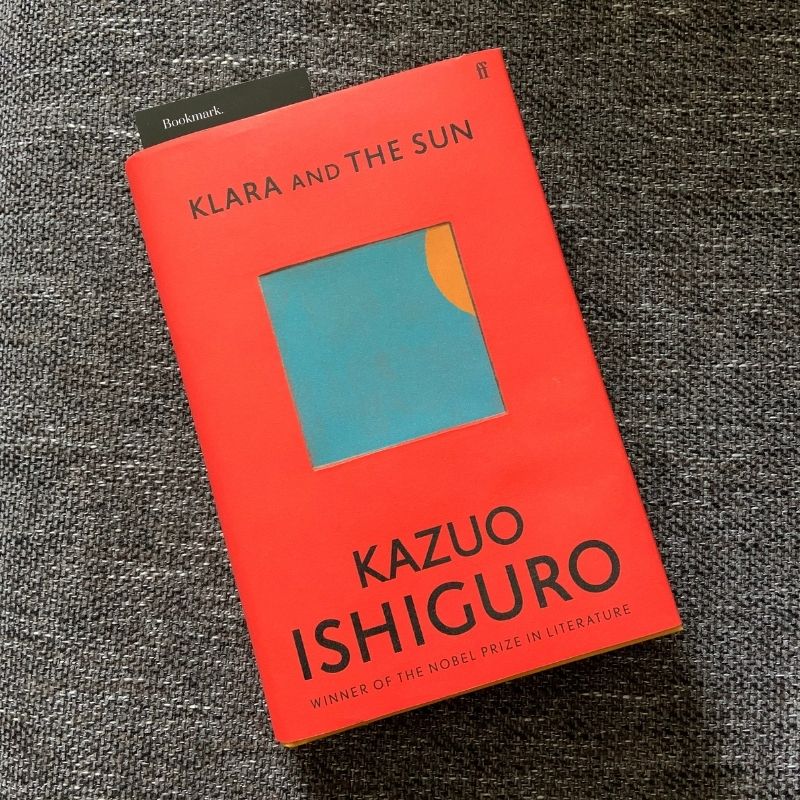A review of Kazuo Ishiguro’s book about love in the modern world.
This post may contain affiliate links, which means I’ll receive a commission if you purchase through my links and images, at no extra cost to you. Please read the full disclosure here.
Although British-Asian author Kazuo Ishiguro has been publishing books for some time now (A Pale View of The Hills, 1982), Klara and The Sun is the first time I have ever come across his work, and he really doesn’t disappoint.
The first thing that drew me to this book was the cover; bright burnt orange, and the sun fading away in the corner of a blue square. And then there was the blurb about an Artificial Friend who observes from her place in the store the behaviour of those who come into the shop, the friendship and competition with the other AFs and people passing by on the street outside. And though anything remotely sci-fi, i.e., Artificial Friend, would normally put me straight off a book, I felt that, even without having read the book at the moment, I was going to read a story that would not look out of place as a Studio Ghibli film.
“Do you believe in the human heart? I don’t mean simply the organ, obviously. I’m speaking in the poetic sense. The human heart. Do you think there is such a thing? Something that makes each of us special and individual?”
– Klara and The Sun, by Kazuo Ishiguro
The book is narrated by Klara, an AF who has exceptional observational skills. She comes across as sensitive, willing to learn from the Manager in order to find an owner, but also a little naïve about humans in general – there is competition from newer AF models in the shop, B3s, and the Manager’s warnings about how children make and break their promises all the time.
When Klara is finally bought by a young girl named Josie, and the cautious Mother, she finds herself living out in the remote countryside, with only one neighbour, Rick and his mother, and the no-nonsense Melania Housekeeper.
Just as the world Klara now inhabits seems alien, so too does the time period of this book. It has all the elements of modern-day, with children’s heads stuck in their oblongs and having minimal opportunities to socialize, but it’s very much a dystopian future. Josie, unlike her friend Rick, has been lifted, and we soon learn this comes with a risk.
Genetically engineered children are given enhanced academic gifts but are certainly lacking in their ability to interact socially, and it leaves the young teenager having to cope with bouts of illness that leave her bedridden for days, she can be a little mean towards Klara and even cruel to her non-lifted friend, Rick. The Mother, though we learn later why, quite frankly comes across as heartless, not just to Klara and Rick but even to her own daughter.
It is Klara then who provides the human element to the story, the one with the heart. She is always trying to find a way to help Josie. Her naivety that that Sun’s nourishment will make her better, helping to reconcile Josie’s and Rick’s friendship when they fall out, being a friend to Mother and Josie’s father, and even agreeing to Mother’s plans if Josie does not make it, will both make and break your heart.
“Let me tell you something, Klara. Children make promises all the time … they promise all kinds of things … They promise to come back … but more often than not, the child never comes back … It’s just the way children are.”
– Klara and The Sun, by Kazuo Ishiguro
The book raises some difficult questions about human ethics – genetically modified humans – and also social decline in modern-day society – which one is inevitably the product of the other. But ultimately, Klara and The Sun is about finding love in unusual places and unusual beings. It is about human love, but also the length at which some of us will go in order to preserve it, regardless of the hurt it may cause to others. And how we can find love, wisdom, and kindness in unexpected places.
The only criticism I have of the book is that Klara’s story finished too early. I felt that we should have learned more about Klara’s journey from when Josie began to get better, to when Klara came to her final resting place – I honestly flicked back a few pages thinking I had missed a whole chapter. So for that unexpected and disappointing quick jump to the end of the book, I give Klara and The Sun a 4 out of 5-star review.
For more information on Kazuo Ishiguro, visit his website or head on over to his Amazon author page for more of his work.
